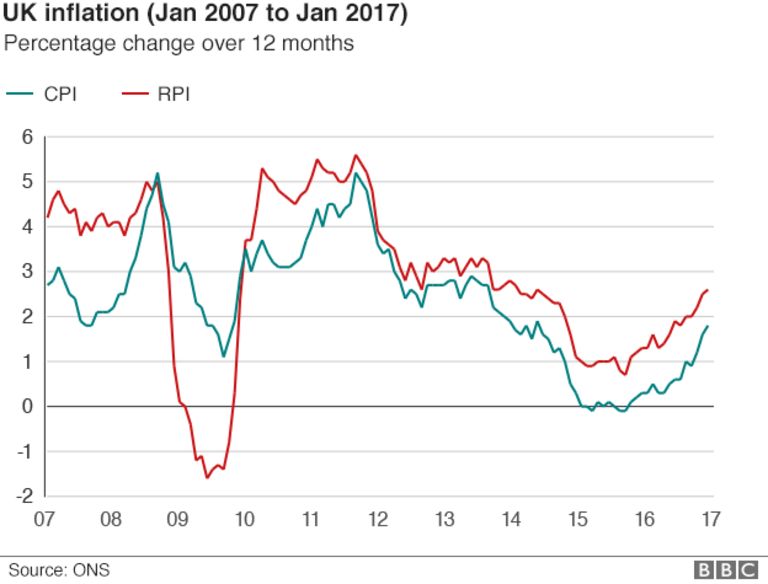Inflation has reached its highest rate for two-and-a-half years, mainly as a result of the rising price of fuel.
Annual inflation as measured by the Consumer Prices Index (CPI) reached 1.8% last month, the Office for National Statistics (ONS) said, up from a rate of 1.6% in December.
It is the fourth consecutive month that the rate has risen and takes inflation to its highest since June 2014.
Fuel prices hit a two-year high in early February, according to the RAC.
As well as fuel, the ONS said food prices also contributed to the rise in inflation, as prices were unchanged between December and January, having fallen a year ago.
Offsetting these factors, the prices of clothing and footwear fell by more than they did 12 months ago.

The increase in the inflation rate takes it closer to the Bank of England's target rate of 2%, which was last seen in December 2013.
Inflation is widely expected to pick up this year as a result of the weaker pound, which is making imported goods more expensive.
Earlier this month, the Bank of England said it expected the inflation rate would hit 2.7% next year.
Rate speculation
Separate ONS figures for producer prices showed that input prices - the amount paid for materials and fuel by UK manufacturers - rose at an annual rate of 20.5% in January, the fastest pace since September 2008, and a rapid pick up in pace from the 15.8% figure seen in December.
The prices of goods leaving factories were up 3.5%
ONS head of inflation Mike Prestwood said: "The costs of raw materials and goods leaving factories both rose significantly, mainly thanks to higher oil prices and the weakened pound."
Chris Williamson, chief business economist at analysts IHS Markit, said: "While the further upturn in price pressures will fuel speculation that interest rates may start to rise later in 2017, the most likely scenario remains one of policy staying on hold over the next two years as the economy navigates through Brexit.
"Further upward pressure on prices looks inevitable in coming months as energy costs continue to climb and firms pass rising costs on to customers, pushing inflation up towards 3.0% in the second half of the year.
"Wage growth has crept up to 2.8%. However, our expectation is that it will slow, or at least remain muted, in 2017 as the labour market cools, providing the Bank of England with leeway to keep policy on hold."
Consumer inflation as measured by the Retail Prices Index (RPI), which includes housing costs, rose to 2.6% in January from 2.5% the month before.
Analysis: Simon Gompertz, personal finance reporter
A red light is flashing. It's been set off by a jump in what our manufacturers are having to pay for imported raw materials.
They face the same fuel price hike as motorists. Metals have gone up, and foodstuffs as well.
Companies aren't passing on the full 20.5% increase yet. They have only put their own prices up by 3.5% on average.
But the ONS warns that the increases are starting to show up on the High Street.
Shoppers are already faced with higher prices for imported cars, computers and kitchen equipment, the result of the drop in the value of the pound.
Soon our own factories could be charging substantially more as well.
No comments:
Post a Comment